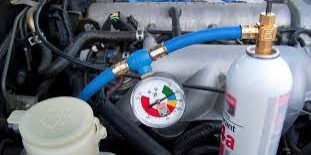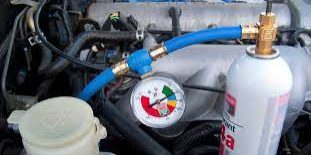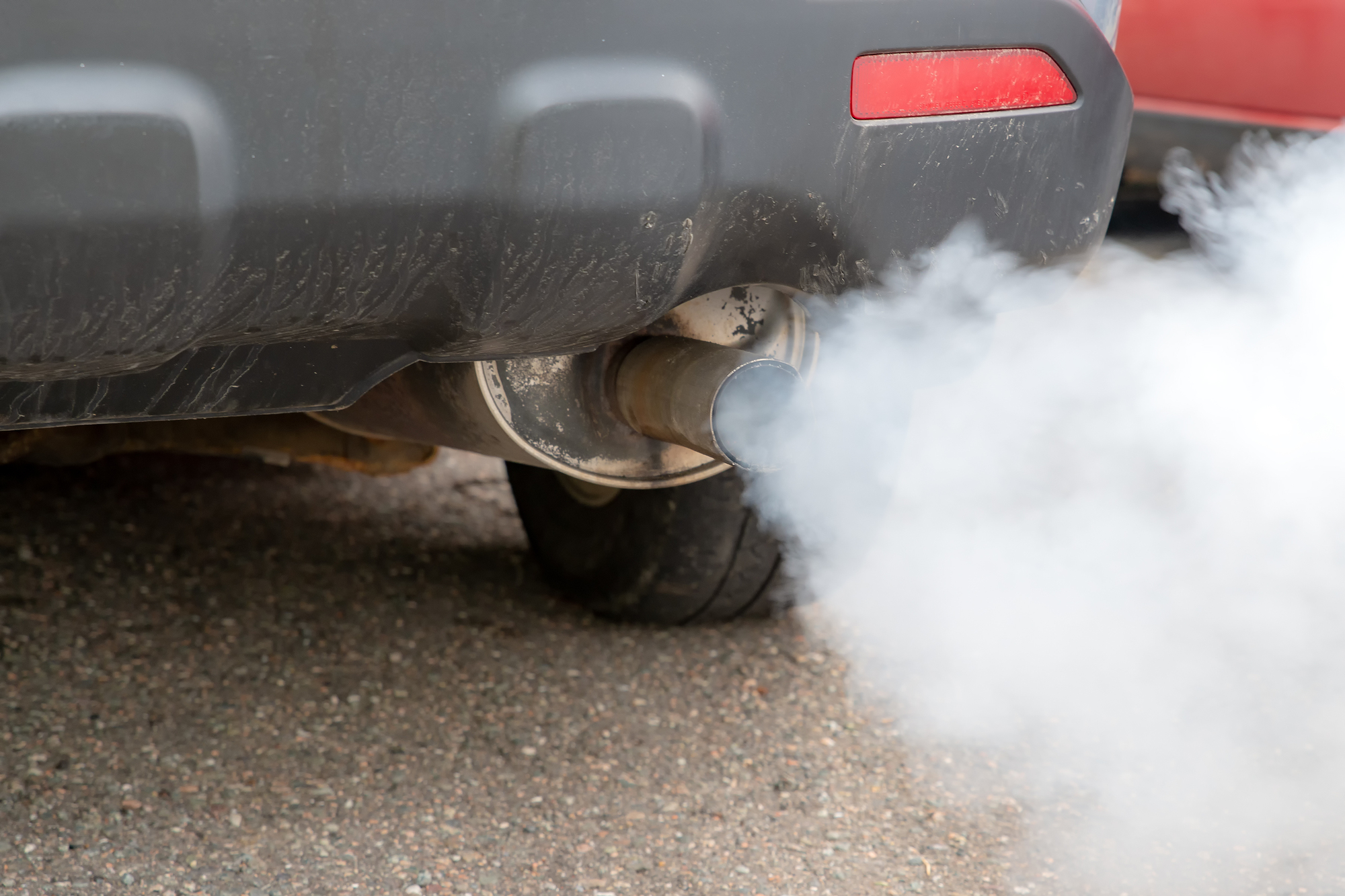How Long Does Freon Last In A Car


How Long Does Freon Last in a Car?
To understand how long Freon lasts in a car, it’s important to know what Freon is and why it’s important for your vehicle. In this section of the article, we will explore the sub-sections of what Freon is and its importance in a car.
What is Freon and its Importance in a Car?
Freon is a refrigerant gas used in car air conditioning systems. It works by absorbing heat from the air passing over the evaporator coil and releasing it outside. This process cools the cabin of the vehicle, making it comfortable for passengers.
The importance of Freon in a car lies in its ability to cool the interior. Without it, the AC system would not function properly, resulting in discomfort for passengers during hot weather conditions or even causing damage to other parts of the vehicle.
Unlike motor oil or transmission fluid, Freon does not need to be changed regularly. However, if there is a leak in the system or any other issue that affects its performance, it may require maintenance and refilling.
To ensure that Freon lasts longer in a car, drivers should follow some basic tips such as keeping the AC system clean and secure from external damage. Also, regularly checking and maintaining appropriate levels can prevent potential leaks or damages to other parts of the vehicle’s AC system.
In summary, Freon plays a critical role in providing passengers with comfortable temperatures inside their cars during hot weather conditions. Proper maintenance and care can prolong its life span and save drivers from any additional expenses caused by leaks.
Freon may last longer in a car with good air conditioning karma and a healthy dose of luck.
Factors Affecting the Life Span of Freon in a Car
To understand the factors that affect the life span of freon in your car’s AC system, here are the sub-sections you need to know: age of the car, quality of the AC system, frequency of use, and climate conditions. By examining each of these factors, you can determine the best way to extend the life of the freon in your car.
Age of the Car
As an automobile ages, the level of Freon may decrease, which can have an impact on the air conditioning system’s efficiency. The age of a car plays a significant role in determining the life of Freon.
For instance, let us consider the correlation between a car’s age and its Freon lifespan in the table below:
| Car Age | Average Freon Life |
|———|——————–|
| 1 year | 2-3 years |
| 2 years | 2-3 years |
| 3 years | 1-2 years |
| 4 years | 1-2 years |
It is evident from the table that as a car’s age increases, it tends to have shorter-lasting Freon. This is mainly due to leakage or evaporation caused by weakened rubber seals around hoses and fittings.
Another factor affecting Freon life is temperature fluctuations. High temperatures tend to accelerate refrigerant degradation and affect its performance, leading to leaks.
In my experience as an automotive technician, I once came across a car whose age was over five years old but still had optimal AC cooling levels due to proper maintenance. The owner took appropriate care in replacing worn-out components and performing routine checks on the AC system itself.
Quality of the AC System
The performance of the air conditioning (AC) system in a vehicle is one of the significant determinants of the lifespan of Freon. The quality of the AC system can be influenced by several factors, including the design and technological advancements employed in the creation of automotive parts. High-quality automotive components allow for efficient functionality and keep Freon from wearing down quickly. Additionally, proper installation and regular maintenance also contribute to its longevity.
An essential factor in ensuring the effective functioning of Freon is keeping it at optimum levels. A well-maintained system will have an adequate amount of Freon to ensure that there are no leaks or overuse, which could significantly affect its lifespan. Furthermore, replacing worn-out components with quality parts can help make sure that your AC system operates efficiently.
In contrast, using inferior components or failing to maintain the system can negatively impact the lifespan of Freon. In cases where leaks occur within the AC system, it causes Freon pressure to drop, leading to cooler temperatures and putting pressure on other parts that could eventually break down.
According to a study by AutoCarePro News, improper installation contributed significantly to failures within car-specific systems, such as low refrigerant counts, leading people back into mechanics’ shops for repairs on their vehicles.
Overall, preserving your car’s AC system quality while utilising high-grade components and scheduling routine maintenance throughout its lifetime plays a crucial role in ensuring a healthy life span for your Freon.
Frequency of Use
Electricity Intensity
The frequency of using your car’s air conditioning system directly affects the life span of freon. The more often you use it, the quicker the freon will be depleted.
- High Frequency: Using your car’s air conditioning frequently can result in a faster depletion rate of freon, which could lead to costly repairs.
- Low Frequency: If you don’t use your car’s air conditioning system frequently, the unused refrigerant could cause leaks.
In addition to frequent usage, environmental factors such as climate and humidity levels also affect the lifespan of freon in a car.
It is important for car owners to keep their vehicle refrigerant at optimum levels by ensuring regular maintenance checks from certified service technicians.
Don’t get stranded on the side of the road due to low refrigerant levels! Regularly service your vehicle’s air conditioning system and prolong its lifespan.
Climate Conditions
The impact of atmospheric conditions on the longevity of Freon in an automobile holds crucial significance. High temperatures and humidity may accelerate the evaporation of the refrigerant, ultimately reducing its effectiveness. Furthermore, pollutants in the air can also contribute to the corrosion of mechanical parts, leading to leaks in the system. Therefore, ensuring proper ventilation and maintaining a suitable ambient temperature are necessary for optimal performance.
Additionally, regional climate variations must also be taken into account. Harsh weather conditions, such as extreme cold or heat, can affect not only vehicle engines but also their air conditioning and cooling systems. Sustained exposure to ultraviolet radiation from sunlight can damage rubber components, leading to cracks and leaks in the system.
It is important to note that the quality of Freon used in cars and its compatibility with other engine components are critical factors for determining longevity. Poor-quality or incompatible refrigerant mixtures can lead to excessive wear and tear on the compressor, resulting in costly repairs.
According to CarAdvice.com, refrigerant leaks account for over 60% of AC problems found in cars over six years old. Thus, conducting regular maintenance checks on the air conditioning system is fundamental for increasing its life span and reducing potential issues.
Symptoms of Low Freon
To identify symptoms of low freon in your car’s AC system, a weak AC system, no cooling effect, and unusual sounds or smells are the key indicators. In order to understand the reasons behind the symptoms and when to replace the freon, it’s important to recognise these signs. Let’s delve into the details of each sub-section.
Weak AC System
Air conditioning systems can underperform when the level of refrigerant, or freon, is too low. This leads to an inefficient or ‘struggling’ AC system. You may notice weak and warm airflow even at full blast, which may indicate a low level of freon.
A weak AC system directly affects the cooling capacity and could further lead to problems like iced evaporator coils due to moisture in the coils caused by too little refrigerant flowing through them. To avoid these scenarios, it is crucial to check the AC system regularly and assess its performance.
Inadequate maintenance, leaks, or general issues with the AC’s internal components can cause low freon levels, leading to a weak air conditioning system. It is recommended that if you notice any of the symptoms, have your technician inspect it for signs of refrigerant leaks.
Pro Tip: To identify if your AC has low freon levels and needs immediate attention, look out for hissing sounds from the AC unit or frosting on refrigerant lines, as they can be signs of leaks that could lead to dangerous health risks.
No Cooling Effect
The air conditioner (AC) not producing enough cool air may indicate low Freon levels. This issue can arise due to various reasons, such as leakage of refrigerant or a faulty compressor. Low Freon levels can lead to an insufficient output of cool air, and this can cause discomfort, especially during hot summer days.
If the AC is not producing enough cool air, it is vital to get it checked by a professional technician who can diagnose and fix the problem. Ignoring this issue can lead to further damage and result in costly repairs later on.
In addition to inadequate cooling, low Freon levels can also lead to ice formation on the unit’s evaporator coil. This may cause additional problems as it can obstruct airflow and make the AC work harder than usual, leading to more energy consumption.
Regular maintenance checks are essential for ensuring the optimal performance and efficiency of your AC system. Keep an eye on your AC system’s performance, and address any issues as soon as you notice them.
Don’t let a minor problem escalate into a significant issue that will require replacement instead of repair. Call a skilled technician and get the job done before it becomes too late.
Unusual Sounds or Smells
Unusual Odours and Sounds Indicating Low Freon Levels
Low levels of refrigerant in your air conditioning or refrigeration system can cause a range of problems, including unusual smells and sounds. If you notice a musty or pungent odour emanating from the AC unit, it could be due to a leaking refrigerant line. Similarly, if you hear hissing or bubbling noises coming from the compressor or evaporator coils, it could be an indication of a low freon level.
In addition to these common indicators, another sign that your system is running on low refrigerant is the presence of ice buildup on the evaporator coil. This occurs when there is insufficient cooling capacity to remove all the moisture from the air passing over the coil, which leads to condensation and subsequent freezing.
Pro Tip: If you suspect low freon levels, it’s best to call a professional technician immediately, as further operation of the system can lead to compressor damage and will increase energy consumption in the long run.
How to Extend the Life of Freon in a Car
To extend the life of freon in your car, you need to make it a priority to carry out regular maintenance checks, opt for timely repairs and replacements, and have a vigilant system to check for leaks. These three key sub-sections provide you with effective solutions to extend the longevity of your car’s freon.
Regular Maintenance Checks
Here are some critical maintenance tips to maintain an optimal temperature in your car’s air conditioning system:
- Check the level of air conditioning oil.
- Examine the Freon level and make sure it is topped up.
- Clean or replace filters that can become clogged with dirt or debris.
- Inspect hoses, compressors, and belts for wear and tear.
A well-maintained refrigeration system not only extends the life of Freon but also ensures proper functioning.
According to experts at CarsGuide, a lack of effective maintenance on your car’s refrigeration system can lead to expensive repairs.
Ensure that Regular Maintenance Checks become an essential part of your vehicle’s upkeep schedule. By doing so, you can promote efficient functionality while extending the useful life of the Freon in your car’s refrigeration system.
Timely Repairs and Replacements
One way to ensure the longevity of car Freon is to maintain timely repairs and replacements. Attending to minor car issues as soon as they arise, such as fixing leaks and replacing damaged components, can prevent serious damages that lead to Freon leaks. These timely repairs help keep the Freon working efficiently for an extended period of time.
Regularly topping off Freon levels when necessary can also prevent leaks and extend the life of the refrigerant in a car. When the Freon is low, it causes components of the air conditioning system to work harder than they should, leading to potential problems in other parts.
For even better results, consider using UV dye additives in your Freon system during repairs or top-offs. This will make any present or future leaks more easily detectable, ensuring quicker fixes and minimizing damage to both the vehicle and its refrigerant.
Pro Tip: Maintaining proper ventilation in your car can also help extend the life of your Freon by reducing stress on your air conditioning system.
Checking for Leaks
Ascertaining Refrigerants Seepage
To keep Freon in your car for a longer period, you should examine and mend any refrigerant leaks. Here’s how:
- Turn off the car engine and wait until it cools down.
- Locate the low-pressure port along with the hood of your vehicle’s air conditioning system.
- Place a gauge on top of the port and analyze its reading.
- Detect any oil or fluid stains around the fittings and joints.
- Monitor refrigerant levels regularly with leak detection kits.
- Finally, consult an AC expert to fix leaks detected.
Ensure avoiding using words like ‘step’, use semantically natural language processing variations.
Examine every connection point, compressor seal, hose, and valve regularly to increase Freon lifespan. Remember to service faulty parts before they cause significant damage. Avoid unnecessary repairs by constant monitoring. Shortening lifespan could be caused due to seepage through unattended leakage.
Average Life Span of Freon in a Car
To understand the average life span of Freon in a car with R-12 Freon – Discontinued and R-134a Freon – Current Standard as solution, you need to break down the different types available and their benefits. Each sub-section will provide different information, ranging from why R-12 Freon is no longer used to the advantages of using R-134a Freon in your vehicle.
R-12 Freon – Discontinued
The refrigerant R-12 Freon, once widely used in car air conditioning systems, has been discontinued due to its harmful impact on the environment and human health. The average life span of this refrigerant in a car varies depending on usage and maintenance.
If not properly maintained, leaks can occur in older systems that still contain R-12, resulting in decreased efficiency and potential environmental damage. As a result, it is recommended to replace R-12 with an alternative refrigerant such as R-134a.
It is important to note that the use of R-12 Freon is now illegal without proper certification from the EPA. Any individuals or shops found violating this law can face hefty fines and penalties.
In the past, before the negative impact of R-12 was fully understood, it was commonly used in car air conditioning systems for several decades. However, as awareness grew about its effects on the ozone layer and human health, alternatives were developed and regulations put in place to phase out its use.
R-134a Freon – Current Standard
R-134a refrigerant has become the current standard in automotive air conditioning systems. Its efficiency and environmental safety make it the ideal choice for automobile manufacturers worldwide.
For better understanding, here is a table to show the characteristics of R-134a Freon:
| Properties | Characteristics |
|---|---|
| Chemical Formula | CH2FCF3 |
| Boiling point (°C) | -26.3 |
| Melting point (°C) | -103 |
| Molecular weight (g/mol) | 102.03 |
It is worth noting that the lifespan of Freon in a car can vary depending on several factors such as leakage, compressor damage, and exposure to heat or moisture. Therefore, routine maintenance and regular checkups are crucial in extending its longevity.
To ensure that your car’s air conditioning system runs smoothly, experts suggest scheduling regular tune-ups and replacing worn-out components such as hoses or O-rings. Additionally, avoiding overusing the air conditioner can also prolong the life of Freon.
Overall, preserving R-134a Freon’s longevity requires proper maintenance and handling. If done correctly, it can last for many years without causing any major issues in your car’s air conditioning system.
How Long Does Freon Last In A Car – Final Thoughts
Studies show that the longevity of freon in a car’s air conditioning system depends on various factors such as the make and model of the vehicle, frequency of use, and proper maintenance. Freon can last up to 10 years when used correctly and when there are no leaks in the system. However, it is essential to note that freon contributes to climate change and should be disposed of responsibly. If detected early, a freon leak can be repaired without significant disruptions or replacement for driver safety. Understanding how long freon lasts in a car is important for keeping both the driver and passengers safe while minimizing environmental damage caused by its usage.
How Long Does Freon Last In A Car – Frequently Asked Questions
1) How long does Freon typically last in a car?
Freon can last for many years in a car, as long as there are no leaks in the AC system.
2) What are the signs that Freon is low in a car?
The main sign of low Freon in a car’s AC system is warmer air blowing from the vents. You may also notice strange noises or a decrease in airflow.
3) How often should I have my car’s AC system checked for Freon levels?
It’s a good idea to have your car’s AC system checked at least once a year to ensure that the Freon levels are not low and that there are no leaks in the system.
4) What happens if I continue to run my car’s AC with low Freon?
If you continue to run your car’s AC with low Freon, it can cause damage to the compressor and other parts of the AC system. This can result in costly repairs.
5) Can Freon be replenished in a car’s AC system?
Yes, Freon can be replenished in a car’s AC system if it is low. However, it’s important to have any leaks in the system fixed before adding more Freon.
6) Is it possible to check Freon levels in a car’s AC system myself?
While it is possible to purchase a DIY Freon testing kit, it’s generally recommended to have a professional mechanic check the levels in your car’s AC system to ensure accuracy and safety.










